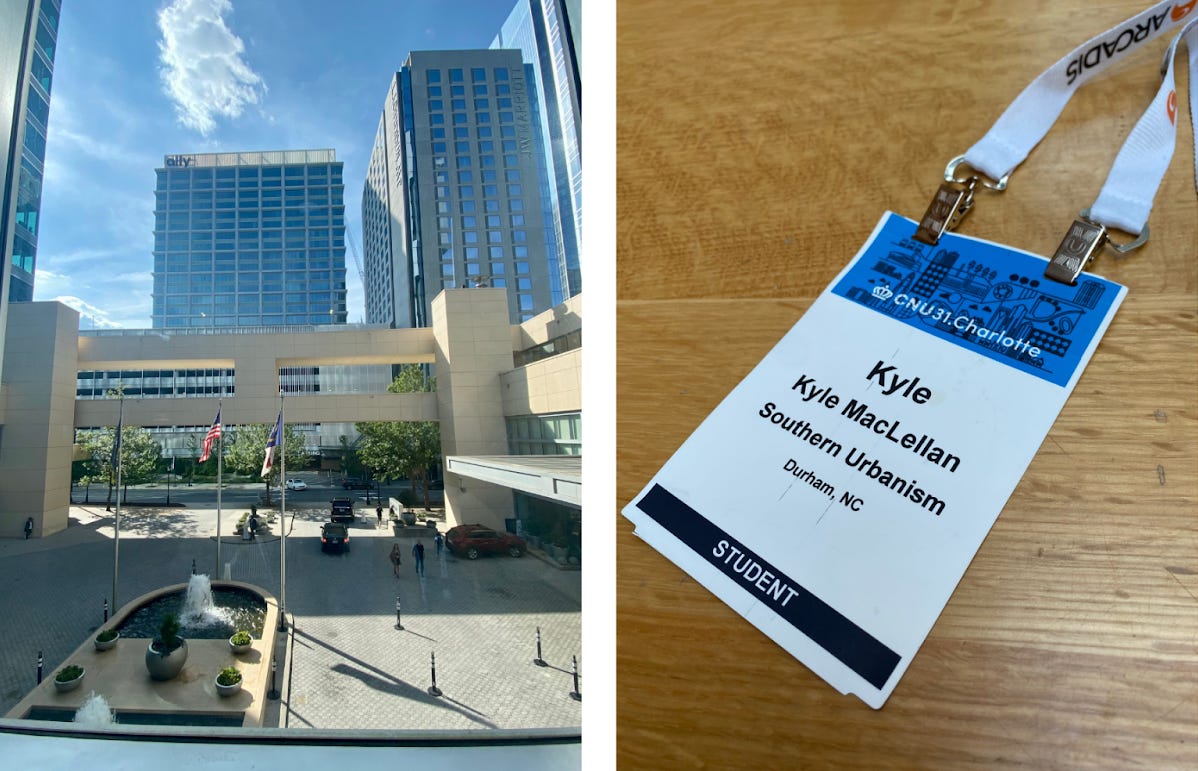ON THE SCENE | My 5 Big Takeaways from CNU31
This year’s conference had a lot to offer the next generation of citybuilders.

Written By Kyle MacLellan
The Congress for the New Urbanism (CNU) is doing something special. Charlotte, North Carolina, was host to the 31st annual Congress, where I attended three days of conversation, panels, and speeches centered around building better cities. I walked away enlightened, inspired, and excited about my future in this movement.
Here are my five big takeaways from my first CNU conference:
There are so many people doing incredible work.
Sitting in on a number of sessions over the three days, I was exposed to some incredible ongoing and completed projects. From the Show & Tell with DPZ CoDesign’s architects to Rob Parker’s detailed presentation of Atlanta’s Trilith, I was amazed by the creativity and beauty exhibited.
But it was the projects rooted in people, more than in places, that impressed me the most. The team behind the EastPoint Project from Oklahoma City has an extraordinary product and an even better story. Their development of community services and retail space on a main corridor brought new entrepreneurial energy to the Eastside district of Oklahoma City.
There’s no substitute for meeting in person.
There was an air of welcoming and subtle humility at the conference. I met people that I had read about, seen in videos, or spoken with over Zoom. But nothing compares to being able to introduce yourself in person. Meeting major characters including Bruzenskey Bois, Tesho Akindele, and Braxton Winston left me somewhat starstruck. As a student, the ability to exchange ideas and get to know people in real time, face to face, is priceless.
There remains a lack of diversity in urban development.
Urbanism needs more women, students, and people of color. The acknowledgement of this fact by the leaders of CNU was important to me.
After attending Friday’s “Attracting and Advancing a Diverse Talent Pool” session, and hearing the blunt recognition of this problem by the panel, I was relieved of the internal tension that accompanies being the minority. Their proposed solutions filled me with hope. The problem isn’t unique to CNU; it's a systemic issue with the broader professions. For CNU to put forth multiple sessions on social justice means that things are going in the right direction. It also meant that a young, multiracial woman like me could enter this space with a bit more ease.
The conference is not as accessible as a newbie would hope for.
As a 19-year-old rising second-year undergrad, I believe that I was the youngest and most inexperienced person in most of the sessions. While the Emerging New Urbanists (ENU) were responsible for the personal and enlightening mentorship huddles lunch that I attended, many of the professional sessions assumed a level of base knowledge that I simply do not have yet.
I attended the conference being aware that things would probably go over my head from time to time, making notes of items to research later. But I do feel that I would have benefited from an introductory session to all things urbanism, along with some additional student-focused content. I have been made aware that CNU is considering structured 101 and advanced tracks, ensuring their message caters to both crowds.
The urbanist cause is not exclusive.
New Urbanism seeks to better life for everyone through the improvement of the built environment. Therefore, everyone should be a part of it. Despite this logic, I was taken aback by the number of different professional backgrounds represented at the conference.
Everyone from rappers and athletes to environmental engineers and politicians has reason to be enthusiastic about New Urbanism. My conference experience started with an inspiring talk from Charlotte Mayor Pro Tem Braxton Winston and closed with wise words from Greensboro City Manager Taiwo Jaiyeoba. The whirlwind of CNU was bookended with discussions of people, purpose, and unity. Keeping those themes in mind while discussing climate, affordable housing, transit, and social justice was essential.
CNU has an opportunity to continue to grow by tapping into an energized wave of young urbanists. In my opinion, much of the interest and attraction will be fostered in the umbrella organization’s subgroups: the Congressional Black Caucus for New Urbanism (CBCNU), ENU, the Incremental Development Alliance (IDA), and others. Overall, I appreciate the care and consideration that went into the cultivation of this massive event, and I am eager to see this organization expand, now from the inside.
CNU32 will be hosted in Cincinnati, Ohio next year. Will you be there?
Kyle MacLellan is Southern Urbanism’s Journalism Fellow for Summer 2023.

